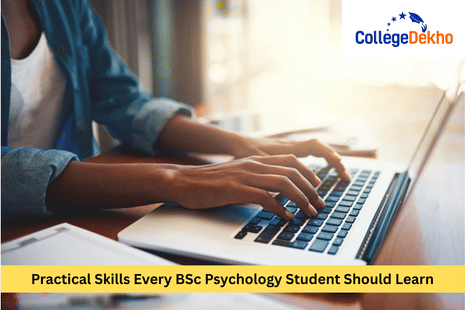To pursue a successful career, BSc. Psychology students must possess the research skills, critical thinking, effective communication, interpersonal skills etc. These skills foster analytical abilities, team work and professionalism in the real world.

A BSc in Psychology involves much more than reading theories and memorising names. To succeed in your studies and prepare for future careers, whether in academia, clinical settings, public health, or elsewhere, developing certain practical skills is essential. The skills that are discussed in this article will help you achieve success during your studies and professional life.
Also Check -
Best Women-Only Colleges for Pursuing B.Sc Psychology in India
Top Essential Skills Every BSc Psychology Aspirants Must Learn
The practical skills every BSc Psychology student should learn have been discussed below:
- Research & Data Analysis Skills
One of the foundational skills for psychology students is being able to design, conduct, and analyse research. Understand different research methods such as experiments, surveys, case studies, and observations.
- Critical Thinking & Analytical Reasoning
You need to have critical thinking skills, looking at evidence carefully, what supports it and what its weaknesses are. You need to solve problems and also be ready to find new ways when a plan does not work out.
- Communication
Communication is important for a BSc Psychology student as they need to express themselves through speaking and writing. You also need to write essays, reports, and make clear points. To present your ideas to others, you must talk, use slides, or posters and also show data through graphs or tables.
- Digital & Technical Skills
A BSc Psychology student should have practical skills involving computers and tools, using software for statistics and data (SPSS, R, etc.), managing references and articles (tools like Zotero or EndNote) or using online tools for surveys or qualitative analysis (questionnaires, coding).
- Ethics & Cultural Sensitivity
Since psychology often deals with people’s feelings and private life, you need to understand ethical rules like confidentiality, getting consent, and not hurting people and also respect different backgrounds, cultures, beliefs, and values.
- Time Management & Organisation
Psychology studies often include tasks like lectures, assignments, labs, and projects. So must have excellent time management skills to meet your deadlines. Stay organised, keep notes, data, and tasks well-sorted in advance. Be disciplined, keep up your work regularly, and avoid a last‑minute rush.
- Stress Management
Psychology often involves dealing with emotional content, long assignments, difficult topics or setbacks. Being able to cope with stress, stay motivated, and recover from failures is very important. This is often overlooked but very valuable.
- Presentation & Teaching Skills
Being able to explain psychological concepts clearly to others (peers, clients, general public) helps you have a grip on the subject. This includes public speaking, making slides, posters, or even teaching/tutoring. A good presentation makes your work more effective.
- Interpersonal Skills & Empathy
You will often have to work with people like clients, team members, and peers. To do this well, you need to listen carefully and understand what people say and also what they are not saying. Being kind to understand others’ feelings and showing empathy.
Also Check -
IGNOU or Regular BSc Psychology: What Works Best for Working Professionals?
Related Articles
| Can a PCM Student do a BSc in Psychology? | BSc Psychology Admissions Without Biology in 10+2 |
|---|
If you have any queries, check out the QnA Zone . For help regarding admissions, fill out the Common Application Form (CAF) or call our helpline number 18005729877. Stay tuned to CollegeDekho for more updates!
FAQs
You do not have to be a math genius, but having basic competence with numbers, statistics, and quantitative methods is very helpful. Many psychology studies require analysing data.
You can combine them: for assignments, use real data, do extra reading, make mini‑projects, present papers, join clubs or groups.
You should start as early as possible, from the first year itself. Even small projects, presentations, or helping in research will help you grow gradually over the years.
These skills help you apply what you learn, prepare for jobs or further studies, and work professionally (in labs, clinics, community, etc).
Practical skills are abilities you can use in real life or in your work/study, such as doing research, analysing data, communicating with people, managing time, being ethical, etc.

















Similar Articles
How to Prepare for IIT JAM 2026 Physics Without Coaching?
CUET PG 2026 Study Plan for 15 Days with a Complete Subject Wise Strategy
CUET PG Bioinformatics Syllabus 2026 (Released): Check Topics, Pattern, Download PDF
CUET PG 2026 Applied Arts Syllabus: Check Topics, Pattern, Download PDF
List of IIT JAM Exams Centres Under IIT Kharagpur
CUET PG 2026 Geophysics Syllabus: Check Topics, Pattern, Download PDF